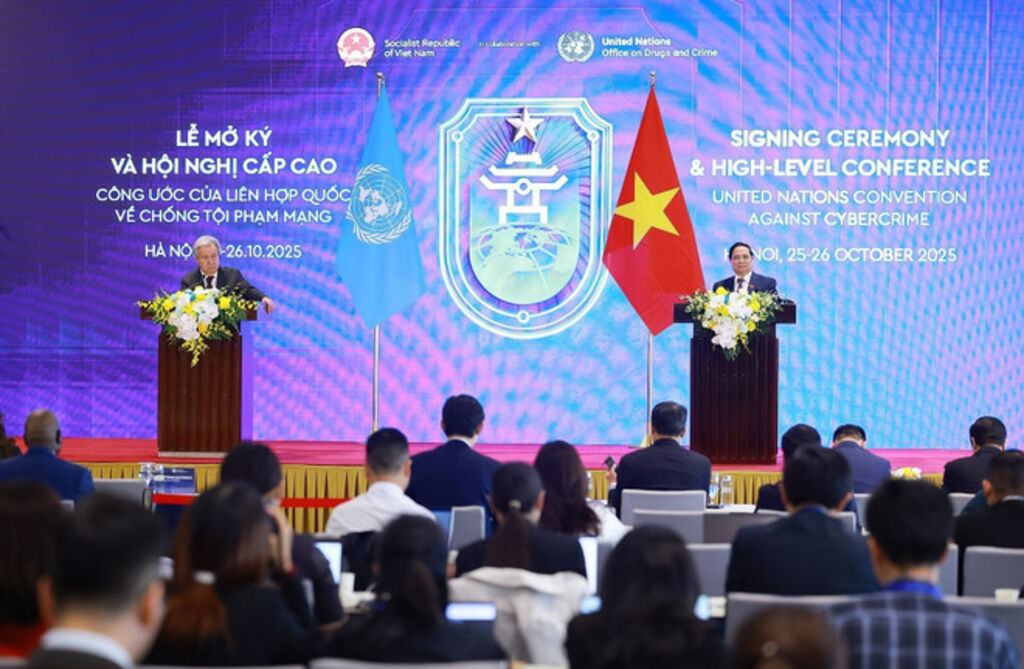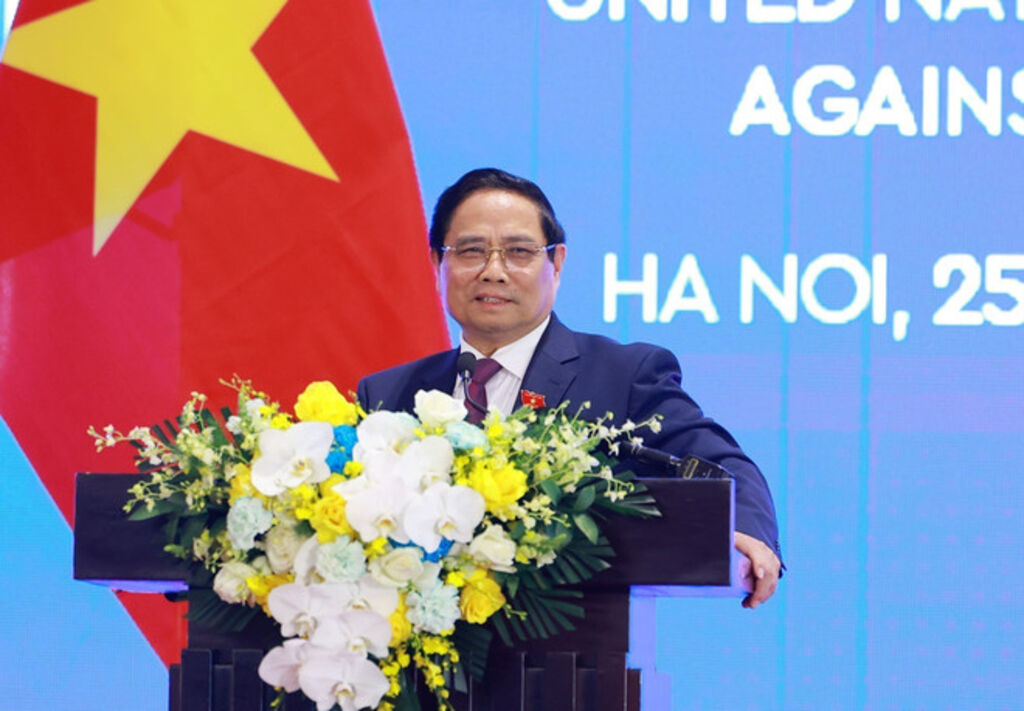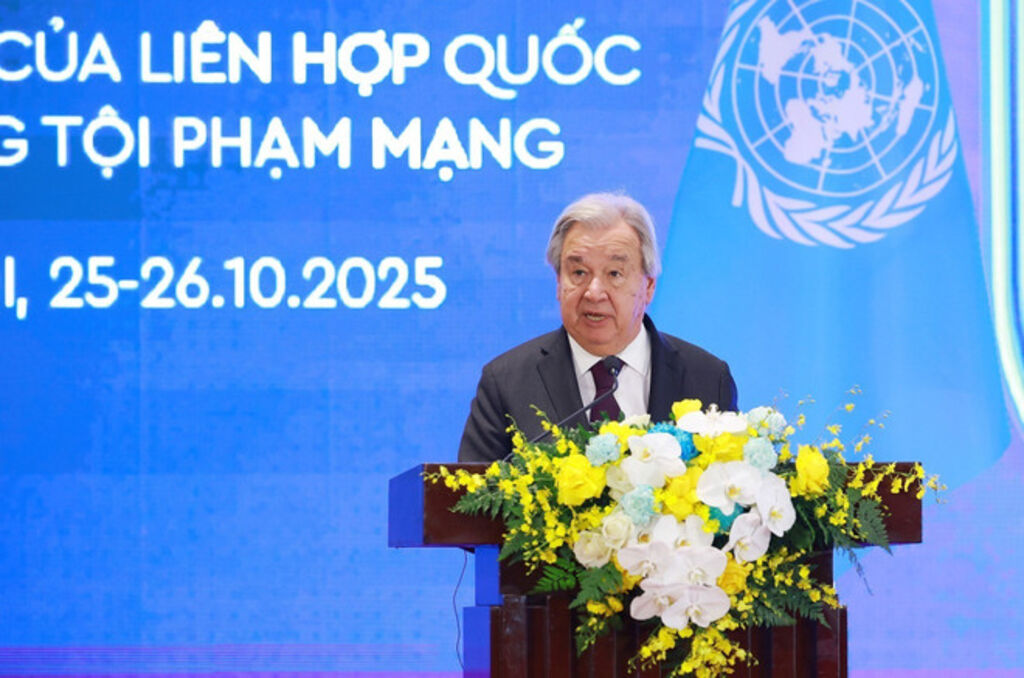 |
| Vietnamese PM, UN Secretary-General attend press conference on signing ceremony of Hanoi Convention__Photo: VNA |
Prime Minister Pham Minh Chinh and United Nations Secretary-General António Guterres met with the press in Hanoi on October 25 following the signing ceremony of the UN Convention against Cybercrime (also known as Hanoi Convention).
Speaking at the press conference, PM Chinh congratulated UN Secretary-General Guterres and the delegates on their visit to Vietnam, saying it was an opportunity to gain a deeper understanding of the Vietnamese people, history, culture, and tradition of hospitality.
He welcomed the guests to Hanoi - a thousand-year-old capital of culture, a city of peace, conscience, and human dignity, and a capital that is developing comprehensively, as well as thanked the distinguished guests for attending the signing ceremony of the Hanoi Convention - a historic event.
The PM highlighted the historical significance of this event, which demonstrated the UN's mission and efforts of strengthening international solidarity and promoting multilateralizm.
 |
| Prime Minister Pham Minh Chinh speaks at the press conference__Photo: VNA |
The signing of the Hanoi Convention outside the UN Headquarters, with the participation of more than 100 countries, 65 of which have already signed the Convention, showed a strong sense of responsibility toward the global and regional situation. These figures underscore the importance of the Hanoi Convention, he stressed.
The PM also emphasized that cybersecurity is not an issue of any single country or individual; it is a matter that concerns all people, all nations, and the entire world.
"Therefore, it is essential to uphold multilateralism and promote solidarity and international cooperation - only then can we effectively combat cybercrime. No country or person can be truly safe if others remain vulnerable to cyber threats," he said.
For his part, UN Secretary-General Guterres thanked the government and people of Vietnam for the generous welcome.
 |
| United Nations Secretary-General António Guterres speaks at the conference__Photo: VNA |
“It is an honor to be in Hanoi for the signing of the United Nations Convention against Cybercrime, a vital global treaty to protect people in the digital world, and the first criminal justice treaty in more than two decades,” he said.
He described the signing of the convention as a historic milestone, noting that it is fitting for the event to take place in Vietnam - a nation that has embraced technology, driven innovation, and become an integral part of the global digital supply chain.
He noted that the internet has connected people in extraordinary ways — ideas, goods, and services. However, every day, cyberattacks disrupt families, shut down critical services, harm economies, and spread horrific child abuse materials.
Until now, there had been no globally agreed rules to address these challenges. Therefore, the UN Convention against Cybercrime provides countries with a powerful new tool to prevent and combat cybercrime while safeguarding human rights online.
It allows law enforcement agencies to share digital evidence across borders — one of the biggest barriers to justice - and establishes a 24/7 cooperation network enabling countries to trace funds, identify perpetrators, and recover stolen assets.
He highlighted that the convention is more than a legal instrument.
“It is a promise that no country, no matter the size of level, developments will be left defenseless against cybercrime, that privacy, dignity and safety must be applied, both offline and online, and that multilateralism can still deliver solutions even on the most complex challenges.”
“I thank Vietnam once again for its leadership and for being a strong voice for international cooperation. Together, we can make cyberspace safe and secure for all,” he said.
Responding to the Vietnam News Agency’s question about what the signatories should do, and how they should demonstrate political commitment to ensure the effective implementation of the Convention so that it can be fully enforced in line with the UNODC’s scheduled roadmap for 2027, the UN Secretary-General said that the most important thing is to ratify it as quickly as possible, and then to promptly establish implementation mechanisms, while ensuring the capacity and privilege for effective international cooperation.- (VNA/VLLF)









